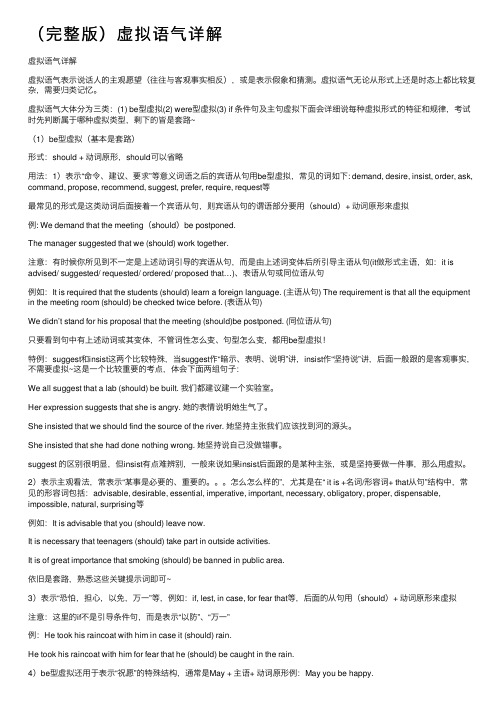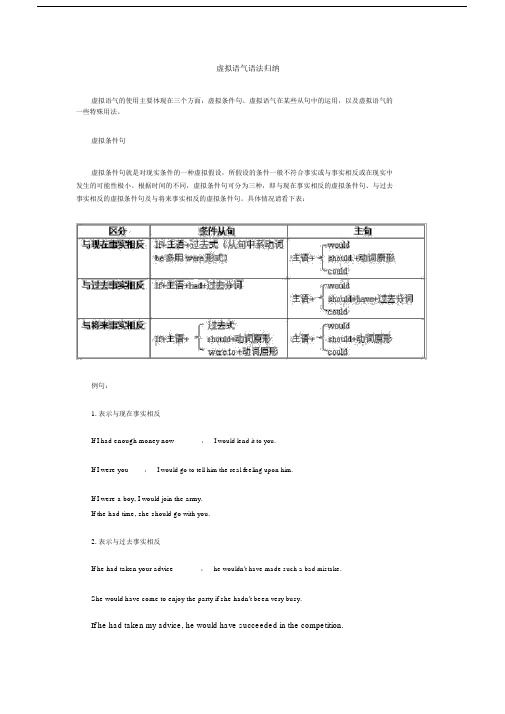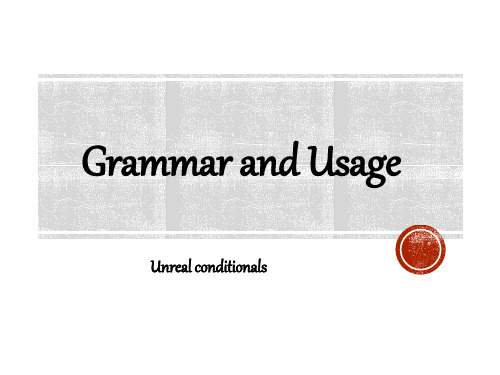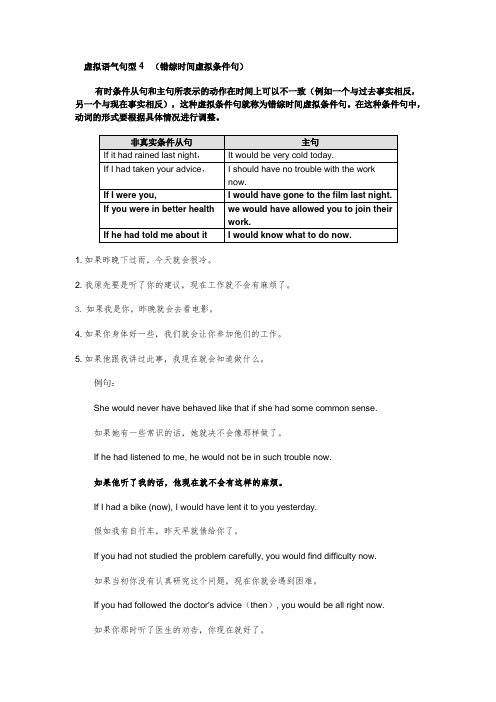(完整版)虚拟语气的错综条件句子
(完整版)虚拟语气用法小结

虚拟语气用法小结一、虚拟语气在条件从句中的用法条件句有两类,一类是真实条件句,一类是虚拟条件句。
如果假设的情况是有可能发生的,就是真实条件何.在这种真实条件句中的谓语用陈述语气。
如: If it doesn't rain tomorrow, we will go to the park.如果假设的情况是过去或现在都不存在的,或将来不大可能发生的,则是虚拟条件句。
如: If he had seen you yesterday, he would have asked you about it。
如果他昨天见到你,他会问你这件事的。
(事实上他昨天没见到你,因此也未能问你这件事。
)1。
在含有虚拟条件句的复合句中,主句和从句的谓语都要用虚拟语气。
虚拟条件从句和主句的动词形式列表如下:2。
错综时间条件句:有时条件从句中的动作和主句中的动作发生的时间不一致(表示错综时间的虚拟语气),这时动词的形式要根据它所表示的时间加以调整。
If you had listened to the doctor, you would be all right now。
如果你当初听了医生的话,身体现在就好了。
(从句动作指过去,主句动作指现在)3。
省略连词if (倒装)。
在书面语中,如果虚拟条件从句中有were,had 或 should,可以把if省略,把这几个词放到主语之前,构成主谓倒装.Should he come (If he should come), tell him to ring me up.Were I you (If I were you), I would not do it。
Were I to meet him tomorrow (= if I were to met him tomorrow), I should ask him about it。
要是我明天见到他,我就会问他这件事的。
Had I had the money last year (= if I had had the money last year), i would have bought the house. 如果我去年有了这笔钱,我就买那所房子了.Should there be any trouble with the boiler, the automatic controlling unit would cut off the fuel oil supply. 假如锅炉出问题的话,自控装置会自动切断燃油的供给.4。
虚拟语气的规则总结word版

虚拟语气虚拟语气:表示动作或状态不是客观存在的事实,而是说话人的主观愿望、假设或推测等。
一、if从句:(一)(二)错综时间的虚拟句:通常情况下,在条件句中主句和从句的谓语动词所指时间一致, 但有时也可能指不同的时间,这时主句和从句的动作不是发生在同一时间,其动词形式要根据时间而定。
1. If I were you, I would have taken his advice. (从句指现在, 主句指过去)。
2. If I had taken my raincoat with me this morning, I would not be wet now. (从句指过去,主句指现在)。
3. If we hadn’t been working hard in the past few years, things wouldn’t be going so smoothly.(从句指过去,主句指现在)。
4. If the weather had been more favorable, the crops would be growing still better.(从句指过去,主句指现在)。
5. If we had not got everything ready by now, we should be having a more terrible time tomorrow. (从句指现在,主句指将来)(三)省略:If 从句中含有were, should, had时,可省略if并把were, should, had提前。
例如:Were I you, I wouldn’t quarrel with him.备注:注:would, should, could与might的选择:①一般常用would,如同在真实条件句中主句常要用will一样。
常译作“将、就会”。
如:If I knew him, I would ask him for help. 如果我认识他的话,我就会向他求助。
完整版虚拟语气必备句子

I Real conditional:句式为(if +从句,+主句)1.主现从现( rule) If the moon goes near the earth, the tide goes high.2.主将从现 If it stops raining later this afternoon, we will eat out.3.主祈从现。
If you are not likely to be in town, please let me know.II Unreal conditional-----背完这些句子你就无敌了~1. Aif 条件句主句与此刻事实相反did( be 动词用 were)主语+ should/ would /could/ might do与过去事实If +主语+ had done主语+ should/ would /could/ might have done与未来相反did/were to do/ should do主语+ should/ would /could/ might do(1). If you were a teardrop in my eye. For fear of losing you, I would never cry.(2)If I had not cut down my hair,I would have looked more beautiful.(3)If I should/were to have Taylor Swift’ s voice, I would sing from morning to night.省略的倒装:(1) 句 1=Were I a teardrop in my eye, For fear of losing you, I would never cry.(2) 句 3= Should I have Taylor Swift’ s voice, I would sing from morning to night.也许 Were I to have If I should/were to/had Taylor Swift’s voice, I would sing from morning to night.C.错综时间(看主句的时间状语)(1)If you had not played basketball in the rain,you wouldn ’get a heavy cold now.(2)--- The weather has been hot and dry.--- Yes.If it had rained even a drop ,things would be much better now!2 委宛条件句( without,or, otherwise,but for )(1) Without you? I ’d be a soul without a purpose.Without you? I would be an emotion without a heart.I ’ m f a ce without expression, a heart with no beat.Without you by my side, I’ m just a flame without the heat.没有你?我将是一个没有目的的灵魂;没有你?我的感情将没有了基础;我将是一张没有表情的脸,一颗停止跳动的心;没有你在我身旁,我但是一束没有热量的火焰。
高中英语语法-虚拟语气全总结

①错综时间条件句:当条件状语从句表示的行为和主句表示的行为所发生的时间不一致时,被称为错综时间条件句,动词的形式要根据它表示的时间作出相应的调整。
如:If you had followed my advice just now, you would be better now.If you had studied hard before, you would be a college student now.②if省略句在条件句中可以省略if, 把were, had, should提到句首,变成倒装句式。
如:If I were at school again, I would study harder.→Were I at school again, I would study harder.如果我还有上学的时机,我会更加努力学习。
If you had e earlier, you would catch the bus.→Had you e earlier, you would catch the bus.如果你来得早点,你就能赶上公共汽车。
If it should rain tomorrow, we would not go climbing.→Should it rain tomorrow, we would not go climbing.如果明天下雨的话,我们就不能登山去了。
③用介词代替条件状语从句常用的介词有with, without, but for。
如:What would you do with a million dollars" (=if you had a million dollars)如果你有100万元,你会做什么?We couldn’t have finished the work ahead of time without your help. (=if we hadn’t got your help)没有你的帮助,我们不可能提前完成这项工作。
虚拟语气之错综语气与特殊句式

1. 如果过去天气好的话,现在庄稼长得更好了.
If the weather ____________finer, had been the crops _______________________still better. would be growing 2.如果你听了老师的建议的话,你现在就不会在医院里
虚拟语气
虚拟语气在 在主语从句中
4.在句型 “It is important (necessary, strange, natural) that .... ” 中,that 后面的从句中的谓语动词用: should + 动词原形 it’s time that +主 +v-ed(should +do ) [例句] 1) It’s necessary that we should have a walk now. 我们有必要出去散散步。 2) It’s natural that she should do so. 她这样做是很自然的。 3) It’s important that we should take good care of the patient. 重要的是我们要照顾好病人。
It’s (about/high) time +that --
过去时 should +V.
你该走了。
It’s high time that you went.
It’s high time that you should go.
我们该睡觉了。
It’s (about) time that we went to bed. It’s time that we should go to bed.
虚拟语气
虚拟语气中的几个特例
(完整版)虚拟语气(表格整理)

虚拟语气(Subjunctive Mood)1.if(条件状语从句)2.wish(宾语从句)/if only(要是……就好了)3.would rather+ 从句(表示宁愿某人在现在或将来要做某事或过去做过某事)4.as if/as though,even if/though + 从句--------------------------------------------------------------------- 5.在表示“坚持、要求、命令、建议”之类的动词后的宾语从句中,用“(should)+动词原形”。
6.虚拟语气用于主语从句7.虚拟语气用于表语从句、同位语从句 [用(should)+动词原形]8.虚拟语气用于定语从句这种从句常用在It is (high) time (that)...句型中,定语从句的谓语动词用过去式或should + 动词原形(should不能省略,be用were来表示),意【好题珍藏】1.Grace doesn’t want to move to New York because she thinks if she there, she wouldn’t be able to see her parents very often. (Pano M6 P16:15) A.lives B.would live C.has lived D.were to live【解析】主句说明了客观事实,if从句是对将来事实的假设。
见“1.if(条件状语从句)——与将来事实相反”。
【答案】D2.If Mr.Dewey present,he would have offered any possible assistance to the people there. (Pano M6 P16:16) A.were B.had been C.should be D.was【解析】见“1.if(条件状语从句)——与过去事实相反”。
公本课堂:虚拟语气中的错综虚拟语气

公本课堂:虚拟语气中的错综虚拟语气
错综虚拟语气:即有时条件从句中的动作和结果主句中的动作所发生的时间不一致
这时,动词的形式应根据它所表示的时间加以调整。
如:
If he had followed the doctor's advice,he would be quite all right now.他当时若是听医生的话,现在就会痊愈了。
(从句说明过去,主句说明现在)
If I were you,I would have gone to the theatre.假如我是你,我会去看话剧了。
(从句的时间包括现在,主句说明过去)
If you hadn't helped me,I couldn't have finished it on time and most likely I would be still working now.假若你没有帮助我,我不可能按时完成工作,很可能现在还在干哩。
(从句说明过去,主句说明过去和现在)
【注意】用直陈语气表示条件和结果
在现代英语里,多用直陈语气表示条件和结果。
直陈语气的条件和结果所表示的往往是事实,这时要遵从“主将从现”原则。
如不是事实,其可能性也较虚拟语气要大。
如:
The dog won't attack you if you sit still.如果你安静地坐着,狗是不会咬你的。
If the rain stops,I'll go for a swim.要是雨停了,我就去游泳。
(完整版)虚拟语气详解

(完整版)虚拟语⽓详解虚拟语⽓详解虚拟语⽓表⽰说话⼈的主观愿望(往往与客观事实相反),或是表⽰假象和猜测。
虚拟语⽓⽆论从形式上还是时态上都⽐较复杂,需要归类记忆。
虚拟语⽓⼤体分为三类:(1) be型虚拟(2) were型虚拟(3) if 条件句及主句虚拟下⾯会详细说每种虚拟形式的特征和规律,考试时先判断属于哪种虚拟类型,剩下的皆是套路~(1)be型虚拟(基本是套路)形式:should + 动词原形,should可以省略⽤法:1)表⽰“命令、建议、要求”等意义词语之后的宾语从句⽤be型虚拟,常见的词如下: demand, desire, insist, order, ask, command, propose, recommend, suggest, prefer, require, request等最常见的形式是这类动词后⾯接着⼀个宾语从句,则宾语从句的谓语部分要⽤(should)+ 动词原形来虚拟例: We demand that the meeting(should)be postponed.The manager suggested that we (should) work together.注意:有时候你所见到不⼀定是上述动词引导的宾语从句,⽽是由上述词变体后所引导主语从句(it做形式主语,如:it is advised/ suggested/ requested/ ordered/ proposed that…)、表语从句或同位语从句例如:It is required that the students (should) learn a foreign language. (主语从句) The requirement is that all the equipment in the meeting room (should) be checked twice before. (表语从句)We didn’t stand for his proposal that the meeting (should)be postponed. (同位语从句)只要看到句中有上述动词或其变体,不管词性怎么变、句型怎么变,都⽤be型虚拟!特例:suggest和insist这两个⽐较特殊,当suggest作“暗⽰、表明、说明”讲,insist作“坚持说”讲,后⾯⼀般跟的是客观事实,不需要虚拟~这是⼀个⽐较重要的考点,体会下⾯两组句⼦:We all suggest that a lab (should) be built. 我们都建议建⼀个实验室。
(完整版)虚拟语气语法归纳..doc

虚拟语气语法归纳虚拟语气的使用主要体现在三个方面:虚拟条件句、虚拟语气在某些从句中的运用,以及虚拟语气的一些特殊用法。
虚拟条件句虚拟条件句就是对现实条件的一种虚拟假设,所假设的条件一般不符合事实或与事实相反或在现实中发生的可能性极小。
根据时间的不同,虚拟条件句可分为三种,即与现在事实相反的虚拟条件句、与过去事实相反的虚拟条件句及与将来事实相反的虚拟条件句。
具体情况请看下表:例句:1.表示与现在事实相反If I had enough money now,I would lend it to you.If I were you,I would go to tell him the real feeling upon him.If I were a boy, I would join the army.If the had time, she should go with you.2.表示与过去事实相反If he had taken your advice,he wouldn't have made such a bad mistake.She would have come to enjoy the party if she hadn't been very busy.If he had taken my advice, he would have succeeded in the competition.3.表示与将来事实相反I would go shopping with you if it were to be Sunday tomorrow.If he were to be given another chance to do it again,he could certainly achieve more.If it were to rain tomorrow, the football match would be put off.1.虚拟条件句的倒装在虚拟条件句中,为了强调所假设条件的虚拟性,或突出说话人的一种主观愿望,虚拟条件句可用倒装结构。
(word完整版)英语虚拟语气语法归纳总结,文档

(word完满版)英语虚假语气语法归纳总结,文档虚假语气 :表示说的话不是事实,不可以能发生也许说可能性很小的情况,表达一种梦想、建议、假设。
一、条件状语从句中的用法从句谓语形式主句谓语形式现在were/ did would/could/should(+not)+ do过去had donewould/could/should/might(not)+ have done将来 1.were/did would/could/should/might2.should do(not)3.were to do+ do简单记法:if were/did, would doif had done, would have doneif were to do/should do, would do举例:If I were you, I would do nothing about it.If you had taken your teacher’ s advice, you wouldn’ t have made such a mistake.If it were to/ should rain tomorrow(表示降水率很低 ),they wouldn’ t go shopping.附注:虚假语气,条件状从倒装状语从句中,去掉if,提前were/ had/ should如: If I were you, I would give up.→Were I you, I would give upIf you had taken the advice, you would have .→ Had you taken the advice, you would haveIf the world should come to an end,→ Should the world come to an end别的, without, but for, otherwise 构成的条件状语从句中,也有委宛的虚假语气But for the popularization of electricity, we would lead a whole different life today. (popularization 普及, publicity 宣传 )Without your help, I would have failed.We’ ll go earlier, otherwise we wouldn’〔tget表示a可seat能性.小〕但其实,高中英语考试也常考:错综虚假语气条件句即:假设条件状从发生的时间与所假设的谓语动词不一致,此时,主句和从句要依照各自的时间而定。
虚拟语气 错综时间条件句等

Unreal conditionals
Do you still remember what is an unreal conditional?
An unreal conditional is a statement about an unreal or imaginary condition or situation
Thank you
We use otherwise, or and phrases beginning with with, without and but
for(要不是), were it not for(要是没有), but that(若不是)in place of if
clauses. 要不是他们的帮助,我们就不可能及时完成那些工作。(表过去) But for their help, we could not have finished the work on time.
If I were you, I would spend my holiday in France.
present
future
错综条件虚拟语气主从句谓语动词要按照假设时间而定
Had I finished my homework last night, I would be allowed to watch TV now.
如果我昨晚完成了作业,现在就被允许看电视了(从句说明过去情况,主 句说明现在情况)
如果从句中含有were, had或should等词时,可将if省去,把were, had, should提到主语前
Without your encouragement, I wouldn’t have succeeded. = If you hadn’t encouraged me, I wouldn’t have succeeded.
错综条件虚拟语气用法

错综条件虚拟语气用法1. 什么是虚拟语气虚拟语气是一种特殊的语气,在语法上表示的是与事实相反或假设情况下的一种语气。
它常用于表达愿望、建议、命令、推测、假设等情况。
虚拟语气分为两种形式:条件虚拟语气和假设虚拟语气。
其中条件虚拟语气用来表示与现在或将来事实相反或假设情况下,虚拟的结果,以“If”引导的条件句为其典型结构。
在条件虚拟语气中,它们的形式和用法非常灵活,包括错综条件、过去条件和将来条件。
在本文中,我们将着重讨论错综条件虚拟语气的用法。
2. 错综条件虚拟语气的用法2.1 错综条件虚拟语气的基本结构错综条件虚拟语气的基本结构由两个分句组成:一个条件从句和一个主句。
条件从句用过去完成时表示过去无法实现的虚拟情况,而主句则用过去完成时、过去将来完成时或过去未来完成时表示对过去无法实现的虚拟结果。
以下是几个典型的错综条件虚拟语气句子:•If I had studied harder, I would have passed the exam.(如果我学习更努力,我就会通过考试。
)•If it had rained, we would have stayed at home.(如果下雨了,我们就会呆在家里。
)•If she had caught the train, she would have arrived on time.(如果她赶上了火车,她就会准时到达。
)在上述例子中,我们可以看到过去完成时和过去将来完成时用来表示过去无法实现的虚拟情况和结果。
2.2 错综条件虚拟语气的用途错综条件虚拟语气的主要用途是表达对过去无法实现的虚拟情况和结果。
它可以用于以下几种情况:2.2.1 表达对过去无法实现的虚拟情况当我们希望谈论一个在过去发生的事件,但此事件事实上并未发生时,我们可以使用错综条件虚拟语气来表达这种虚拟情况。
例如:•If I had known you were coming, I would have prepared dinner.(如果我知道你要来,我就会准备晚餐了。
虚拟语气句型 4 (错综时间虚拟条件句)

虚拟语气句型 4 (错综时间虚拟条件句)有时条件从句和主句所表示的动作在时间上可以不一致(例如一个与过去事实相反,另一个与现在事实相反),这种虚拟条件句就称为错综时间虚拟条件句。
在这种条件句中,动词的形式要根据具体情况进行调整。
1. 如果昨晚下过雨,今天就会很冷。
2. 我原先要是听了你的建议,现在工作就不会有麻烦了。
3.如果我是你,昨晚就会去看电影。
4. 如果你身体好一些,我们就会让你参加他们的工作。
5. 如果他跟我讲过此事,我现在就会知道做什么。
例句:She would never have behaved like that if she had some common sense.如果她有一些常识的话,她就决不会像那样做了。
If he had listened to me, he would not be in such trouble now.如果他听了我的话,他现在就不会有这样的麻烦。
If I had a bike (now), I would have lent it to you yesterday.假如我有自行车,昨天早就借给你了。
If you had not studied the problem carefully, you would find difficulty now.如果当初你没有认真研究这个问题,现在你就会遇到困难。
If you had followed the doctor's advice(then), you would be all right now.如果你那时听了医生的劝告,你现在就好了。
If you hadn’t finished the homework by now, you would not be allowed to see the film this evening.假如你现在还没有完成作业,就不会允许你今晚去看电影。
句型说明:错综时间条件句中,特别注意时间状语,在这种情况下必须明确给以时间或通过上下文可明白看出时间不同,否则就按前面表格中一般时间搭配使用。
高考必考语法改错之虚拟语气十大经典错误

虚拟语气十大典型错误例析
【改错】
虚拟语气用于宾语从句
__ 72. How I wish I can pay a visit to Beijing could
注意!
• wish+(that)+主+ 过去式/were
•
过去完成时
•
could/would do/be
• 注:wish宾语从句中可用could/would,不用should.
t^o
注意!
与将来事实相反
条件 If 从句的谓语 主句的谓语形式
从句 形式
将来
过去时(were) were to do/be
would/could/should/might +v. (原)
should do/be 高考必考语法改错之虚拟语气十大经典 错误
虚拟语气十大典型错误例析
【改错】
混合条件句
41. If you asked him yesterday, you yweosuteldrdkanyow what to do now.
【改错】
虚拟语气用于宾语从句
__ 71. I wish I was as tall as you.
were
注意!
• wish+(that)+主+ 过去式/were
•
过去完成时
•
could/would do/be
• 注:wish宾语从句中可用could/would,不用should.
高考必考语法改错之虚拟语气十大经典 错误
(do) free)
nothing
a(nsdhould)be
set
fre.e(be/set
虚拟语气用法归纳完整版

虚拟语气用法归纳英语的动词一般可带有三种不同的语气:陈述语气,祈使语气和虚拟语气。
不同的语气用动词的不同形式(有的还借助句法形式)来表示。
一、虚拟条件句条件句有两类:一类是真实条件句,一类是虚拟条件句如果假设的情况是有可能发生的,就是真实条件句,谓语用陈述语气。
If you don 'work hard, you will fail.If it is fine tomorrow, we will go for a picnic.如果假设的情况过去、现在、将来都不存在,则为虚拟语气虚拟条件句和对应主句的动词形式列表:1•与现在事实相反的虚拟What would you do if you won the lottery?If I were you, I would seize the cha nee to go abroad.If I had a lot of money no w, I would travel around the world.2. 与过去事实相反的虚拟If you had bee n here yesterday, you would have see n her.If he had driven more carefully, he would not have had the car accident yesterday.3. 与将来事实相反的虚拟If it were to rain/should rai n/rai ned tomorrow, our pla n would be put off.If we were to pic nic, we would not be able to help.二、错综、混合虚拟语气通常,在上面表格里反映的是非真实条件句的虚拟语气模式,从句和主句的谓语动词时间是一致的,如果两者时间不一致,此时就是混合型虚拟语气。
混合型虚拟语气的使用要求“各自为政”,即从句和主句根据各自假设的时间不同,采用上面表格中对应的的谓语动词形式。
高中英语知识点归纳虚拟语气的常见错误使用

高中英语知识点归纳虚拟语气的常见错误使用虚拟语气(Subjunctive Mood)是英语语法中的一种特殊语气形式,用于表示说话人的愿望、建议、假设、怀疑、命令等情态。
虚拟语气在高中英语学习中是一个重要的知识点,但很多学生在使用虚拟语气时存在一些常见的错误。
本文将对这些错误进行归纳总结,并提供正确的用法。
一、错误使用“if引导虚拟条件句”在虚拟条件句中,通常使用“if”引导从句,但有时学生会错误地使用“when”、“unless”、“while”等词语来引导从句。
正确的做法是使用“if”引导虚拟条件句。
错误示例:1. When he will come, I will be happy.(当他来的时候,我会很开心。
)2. Unless it will rain, we will have a picnic.(除非下雨,否则我们会去野餐。
)正确示例:1. If he comes, I will be happy.(如果他来,我会很开心。
)2. If it doesn't rain, we will have a picnic.(如果不下雨,我们会去野餐。
)二、错误使用虚拟条件句的时态虚拟条件句中的谓语动词应该使用过去时态,而不是现在时态。
有时学生会错误地使用现在时态来表示虚拟条件。
正确的做法是使用过去时态或过去完成时态。
错误示例:1. If he is rich, he will buy a car.(如果他有钱,他会买一辆车。
)2. If I have studied harder, I will pass the exam.(如果我学得更努力些,我就能通过考试。
)正确示例:1. If he were rich, he would buy a car.(如果他有钱的话,他会买辆车。
)2. If I had studied harder, I would have passed the exam.(如果我当初学得更努力些,我就能通过考试了。
虚拟语气用法总结(超好_原创)

虚拟语气概念:谓语v用不同的形式表示说话人的不同意图,这种形式称为语气。
语气分三种:1.陈述语气:用来陈述一个事实,或提出一种看法,有肯定、否定、疑问、感叹等形式。
He is late for class. What fun!He is not interested in classical music.2.祈使语气:用来表示请求、邀请、命令、警告或劝告等(动词常用原形)Don’t be late!3.虚拟语气:表示说话人所说的不是事实,而是一种假设、愿望、怀疑或推测。
一、虚拟语气在if非真实条件句中虚拟条件从句(If) 主句与现在事实相反的假设主语+did/were 主语+should / would/could / might + do与过去事实相反的假设主语+ had done 主语+ should / would/ could / might +have done与将来事实相反的假设主语+1.did主语+should / would/could / might + do2.should do3.were to do1.如果我是你,我会接受他的建议。
If I were you, I would accept his advice.2.如果明天下雨,我会待在家里。
If it rained/should rain/were to rain tomorrow, I would stay at home.3.如果你以前好好学习,你会通过考试的。
If you had studied hard before, you would have passed the exam.You didn’t let me drive. If we ______ in turn, you ______ so tired.A.drove; didn’t getB.drove; wouldn’t getC.were driving; wouldn’t gethad driven; wouldn’t have got________ it rain tomorrow, we would have to put off the visit to the Yang Pu Bridge.A.Were ShouldC.WouldD. Will注意:1.错综时间虚拟语气当从句主句所表示的行为所发生的时间不一致时,动词的形式要根据它所表示的时间作出相应的调整。
错综虚拟语气的用法归纳

错综虚拟语气的用法归纳
虚拟语气是一种表示虚拟、假设或推测的语气。
它通常通过动词形态的变化来体现,一般用在条件句、愿望句、建议句、命令句等语境中。
错综虚拟语气的用法较为复杂,需要我们仔细分析。
1. 条件句中的错综虚拟语气
如果条件句中的谓语动词是将来时,主句谓语动词要用过去式的虚拟语气,表示假设的情况不可能发生。
例如:如果我有一百万,我会去旅行。
(现在不可能拥有一百万) 如果条件句中的谓语动词是过去式,主句谓语动词要用过去完成时的虚拟语气,表示假设的情况与过去相反。
例如:如果我昨天睡过头了,我就迟到了。
(但实际上我没有迟到)
如果条件句中的谓语动词是过去完成时,主句谓语动词要用过去完成时的虚拟语气,表示过去某个假设的情况并未发生。
例如:如果我昨天没睡过头,我就不会迟到了。
(但实际上我迟到了)
2. 希望句、建议句、命令句中的错综虚拟语气
希望句、建议句、命令句中的虚拟语气通常用于表达对某种情况的期望、建议或命令。
在这些语气中,错综虚拟语气的用法也十分常见。
例如:
希望句:我希望你走的时候把门关上。
(现在的期望)
建议句:如果你不赶紧去看医生,你会更难受的。
(假设的建议) 命令句:如果你再这样做,我就报警了。
(假设的命令)
总之,错综虚拟语气是一种较为复杂的语法现象,需要我们在实际运用中多多练习,才能准确地掌握其用法。
- 1、下载文档前请自行甄别文档内容的完整性,平台不提供额外的编辑、内容补充、找答案等附加服务。
- 2、"仅部分预览"的文档,不可在线预览部分如存在完整性等问题,可反馈申请退款(可完整预览的文档不适用该条件!)。
- 3、如文档侵犯您的权益,请联系客服反馈,我们会尽快为您处理(人工客服工作时间:9:00-18:30)。
虚拟语气的错综条件句子,也就是常说的混合条件句,即虚拟条件从句和主句动作发生的时间不一致,因此,主句和从句的谓语动词应根据所指的时间选用适当的虚拟语气形式。
例如:1)If I were you,I wouldn’t have missed the film last night.如果我是你,我就不会错过昨天晚上的那部电影。
(从句与现在事实相反,主句与过去事实相反。
)
2)If he had followed the doctor’s advice,he would recover already.如果他遵照医生的劝告,现在病就好了。
(从句与过去事实相反,主句与现在事实相反。
)
混合虚拟语气
有时主句和从句的谓语动词指不同的时间,这时需要用混合虚拟语气。
一般来说,在这种情况下,主从句谓语动词指代的时间不同,所以我们又可以错综时间条件句,在这种虚拟情况,动词形式应根据实际情况灵活使用,在做这些题目时候尤其要注意每道题目的提示语:时间
状语。
绝大多数情况下,从句或者主句都有相关的时间状语,这是解题的关键。
If you that late movie last night, you wo uldn”t be so sleepy.t be so sleepy.
A. hav”t watched
B. didn”t watch t watch
C. ha”t watched
D. wouldn”t have watched 答案选C。
Many dead would now be alive if they have not attempted to return for something. Many dead would now be alive if they have not attempted to return for something. Had Paul received six more votes in the last election, he would be our chairman now.混合虚拟语气还有一种情况就是事实和虚拟假设的混合句,这样的句子不仅仅是时间的不同,而重要是事实和假设的混合。
I would have gone to visit him in the hospital had it been at all possible, but I was fully occupied the whole of last week.n the hospital had it been at all possible, but I was fully occupied the whole of last week.该句前半部分是假设虚拟,而后半部分是事实的陈述。
Your math instructor would have been happy to give you a make-up examination had you gone and explained that your parents were ill at the time. e time.该句前半句用的是假设虚拟,后半句主句也用的是假设虚拟(如果你去并且解释的话),但是后半句的从句用的是事实语气,因为“父母病了”是客观事实,故不需要用虚拟形式had been。
